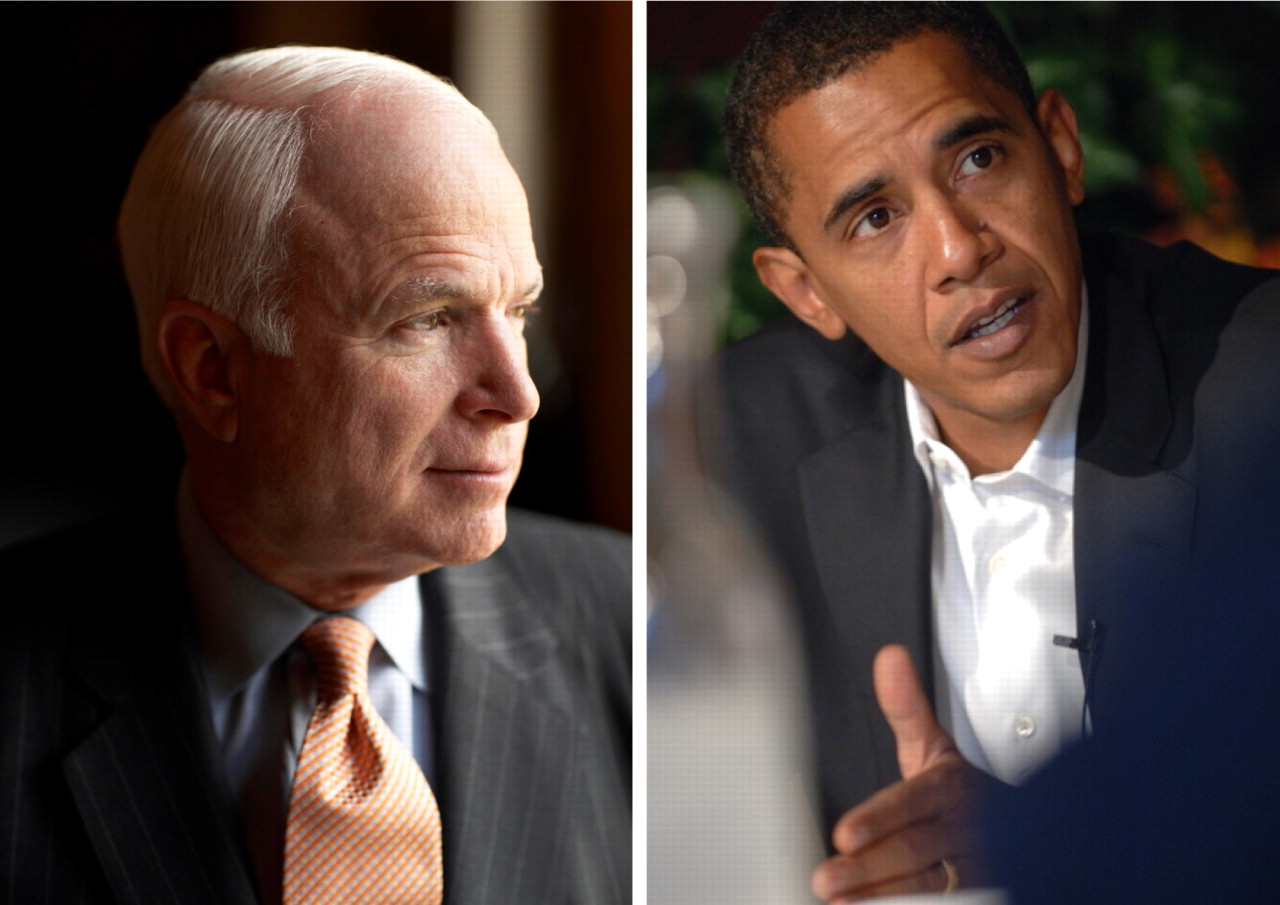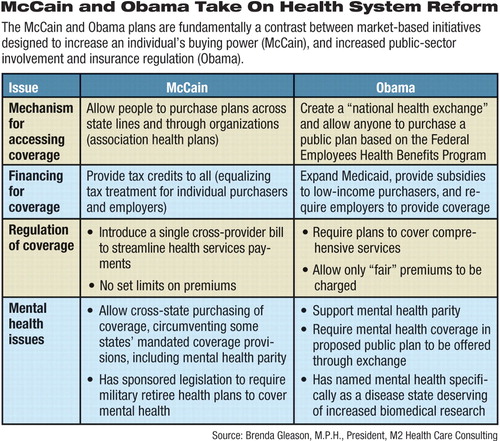Candidates on Health Care: Public Sector vs. Market Based
Presidential candidates John McCain and Barack Obama offer approaches to health system reform that are distinctly different—but both also leave major unanswered questions about how they would achieve what they propose.
Obama proposes creation of a national health insurance plan similar to the Federal Employees Health Benefits Program (FEHBP) that would be available to all Americans, including the self-employed and employees of small businesses. Coverage would be guaranteed by prohibiting participating insurers from rejecting people because of a preexisting illness.

John McCain (left) and Barack Obama offer starkly different versions of health system reform. McCain proposes market-based initiatives designed to increase the buying power of individuals, while Obama proposes greater public-sector involvement and insurance regulation.
Credit: www.JohnMcCain.com
Credit: www.barackobama.com
Both candidates have spoken positively about parity for treatment of mental illness, but Obama's proposal as it appears on the candidate's Web site is unique in explicitly supporting parity; the FEHBP—the model for Obama's national plan—offers parity coverage of mental illness. McCain does not have a stated position on parity.
Other features of Obama's proposal are a plan to require employers who do not offer health insurance to contribute a percentage of payroll toward the costs of the national plan and creation of a health tax credit of up to 50 percent on premiums paid by small businesses on behalf of their employees.
McCain emphasizes changes in the tax treatment of employer-sponsored health benefits and federal subsidies for individuals to buy insurance, increased use of health savings accounts, and expansion of the private insurance market by allowing individuals to purchase health insurance across state lines and through organizations and associations other than employers.
McCain proposes a tax credit of $2,500 for individuals and $5,000 for families to offset the cost of insurance. Those obtaining insurance that costs less than the credit “can deposit the remainder in expanded health savings accounts,” according to the McCain for President Web site.
He also proposes to work with states to develop a “guaranteed access plan” for those with chronic illness. “One approach would establish a nonprofit corporation that would contract with insurers to cover patients who have been denied insurance and could join with other state plans to enlarge pools and lower overhead costs.”
In an article comparing the candidates' plans in the August 21 New England Journal of Medicine (NEJM), Jonathan Oberlander, Ph.D., wrote that the McCain and Obama plans are fundamentally a contrast between market-based initiatives designed to increase an individual's buying power (McCain), and increased public-sector involvement and insurance regulation (Obama).
“Currently, workers do not pay taxes on health insurance premiums paid by their employers,” Oberlander wrote. “The McCain plan would eliminate this tax exclusion and use the revenue generated—projected to be $3.6 trillion over 10 years—to pay for refundable tax credits for Americans obtaining private insurance ($2,500 for individuals, $5,000 for families). Uninsured Americans could use their credits to help buy insurance coverage on the individual market, and workers with employer-sponsored insurance could use theirs to offset the cost of paying taxes on their employers' premium contributions or to purchase coverage on their own.

“In contrast to John McCain's emphasis on markets and deregulation, Barack Obama's reform plan relies on an employer mandate, new public and private insurance programs, and insurance-market regulation,” Oberlander wrote. “The core of the Obama plan is a requirement that employers either offer their workers insurance or pay a tax to help finance coverage for the uninsured.... The Obama plan would also create two new options for obtaining health insurance: a new government health plan (similar to Medicare) and a national health insurance exchange.... And private insurers could not deny coverage because of preexisting conditions or charge substantially higher premiums to sick enrollees: the Obama plan would end medical underwriting according to health status.”
Oberlander is an associate professor of social medicine and of health policy and administration at the University of North Carolina, Chapel Hill. The NEJM article is titled “The Partisan Divide—The McCain and Obama Plans for U.S. Health Care Reform.”
Health policy experts agreed that like much campaign rhetoric, both candidates' proposals offer rosy pictures that lack crucial details.
“Both McCain's and Obama's proposals are at a level of abstraction that makes it hard to know how they would immediately affect patients and psychiatrists,” APA past President Steven Sharfstein, M.D., chair of APA's Ad Hoc Task Force on Health System Reform, told Psychiatric News. “But it is quite important for both candidates to address the issue of parity and to acknowledge that there is no reason for discriminatory provisions when it comes to psychiatric illness. That should be the gold standard for American psychiatry—that we are treated no different than the rest of medicine.”
Among the details missing from Obama's proposal, for instance, is the cost of his plan.
“It's going to be expensive getting all those people covered,” said Aaron Carroll, M.D., M.S., an associate professor of pediatrics and director of the Center for Health Policy and Professionalism Research at Indiana University School of Medicine.
Carroll noted that the concept of guaranteed access strikes at the very heart of for-profit insurance, and that Obama's plan does not include a mandate for individuals to buy insurance.
“Health insurance companies make money by covering healthy people, not by covering sick people—that's how it works,” Carroll told Psychiatric News. “If you force them to take all comers, it's difficult to see how they would accept that.
“And by not enforcing a mandate on individuals to buy insurance, the plan ignores the fact that insurance works by taking money from the well and giving it to the sick. If you don't require healthy people to get insurance, you have a pool only of the sick.”
Neither has Obama specified what the eligibility limits would be on his proposed expansion of Medicaid and the State Children's Health Insurance Program.
Likewise, Carroll said that McCain's emphasis on tax credits and health spending accounts (HSAs), while possibly lowering the costs of insurance for some individuals, does little to address overall health expenditures.
“The problem is that HSAs aren't really going to do much in terms of cost containment,” Carroll said. “The vast majority of health spending in this country is done by very few people, who are chronically ill. They have no choice in how much they spend, so a health savings account will do nothing for them. Health savings accounts are great if you are healthy, but they don't do much for you if you are sick.”
Of McCain's plan for creating a guaranteed access plan, he said,“ How that will be accomplished is not mentioned at all.”
The missing details in both candidates' plans may also reflect the difficulty of solving the health care dilemma, a problem that has vexed American public policy for three decades. And policymakers are haunted by the failure of the Clinton health care proposal in the 1990s, a proposal that might be said to have died from the weight of its own extraordinary detail.
Still, many policy analysts believe the twin mounting problems of cost and lack of access make some kind of reform inevitable. “I think you would be hard pressed to find anyone who says there isn't a problem,” Carroll said. “Everyone knows we have to do something.”
He added that for all the attention paid to the candidates' proposals, it will be neither McCain nor Obama alone who will reform American health care. “We focus on the candidates' proposals as if those are the plans we will have to engage, but we shouldn't forget that it's Congress that has to pass a bill,” he said.
“The McCain and Obama health plans,” wrote Oberlander,“ are best viewed as sketches rather than finished portraits, with many important details yet to be revealed.”
Information on Obama's health care proposal is posted at<www.barackobama.com/issues>. Information on McCain's proposal is posted at<www.johnmccain.com/Informing/Issues/19ba2f1c-c03f-4ac2-8cd5-5cf2edb527cf.htm>.“ The Partisan Divide—The McCain and Obama Plans for U.S. Health Care Reform” is posted at<http://content.nejm.org/cgi/content/full/359/8/781>.▪



